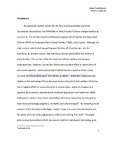[Welfare Reform Impacts Adolescents]

View/
Author
Palakshappa, Sanjay
Subject
Washington and Lee University, Shepherd Poverty Program
High school students -- Mental health
High school students -- Health and hygiene
Dropouts
Teenage pregnancy
Personal Responsibility and Work Opportunity Reconciliation Act of 1996 (United States)
Metadata
Show full item recordDescription
Sanjay Palakshappa is a member of the Class of 2008 of Washington and Lee University. Capstone; [FULL-TEXT FREELY AVAILABLE ONLINE] By signing the welfare reform bill, the Personal Responsibility and Work Opportunity Reconciliation Act (PRWORA) in 1996, President Clinton changed welfare as we know it. . . . Although the main concern with the bill was getting poor families off of welfare and into the workforce, an inherent concern was how these reforms would affect the children in these families. The number of families that have left the welfare rolls has been unprecedented. However, has welfare reform had a positive affect on adolescents of low‐income parents? . . . Numerous recent empirical studies on the well‐being of these adolescents have discovered that welfare reform has had a negative affect on post‐pubescents in several areas: academic progress and cognitive development, behavioral and emotional adjustment, and health and safety. Furthermore, studies have shown that welfare reform has caused low‐income girls to have increased teenage pregnancy, childbirth, and school dropout. By reviewing crucial research of this developmental stage in youth, I hope to discover why adolescents are faring the worst out of any age group as mothers are moving from work. This paper aims to show how welfare reform has caused a decline in adolescent well‐being, posit theories as to why these adolescents are faring worse, and recommend some public policy reforms that may increase the well‐being of these young adults. [From Introduction]